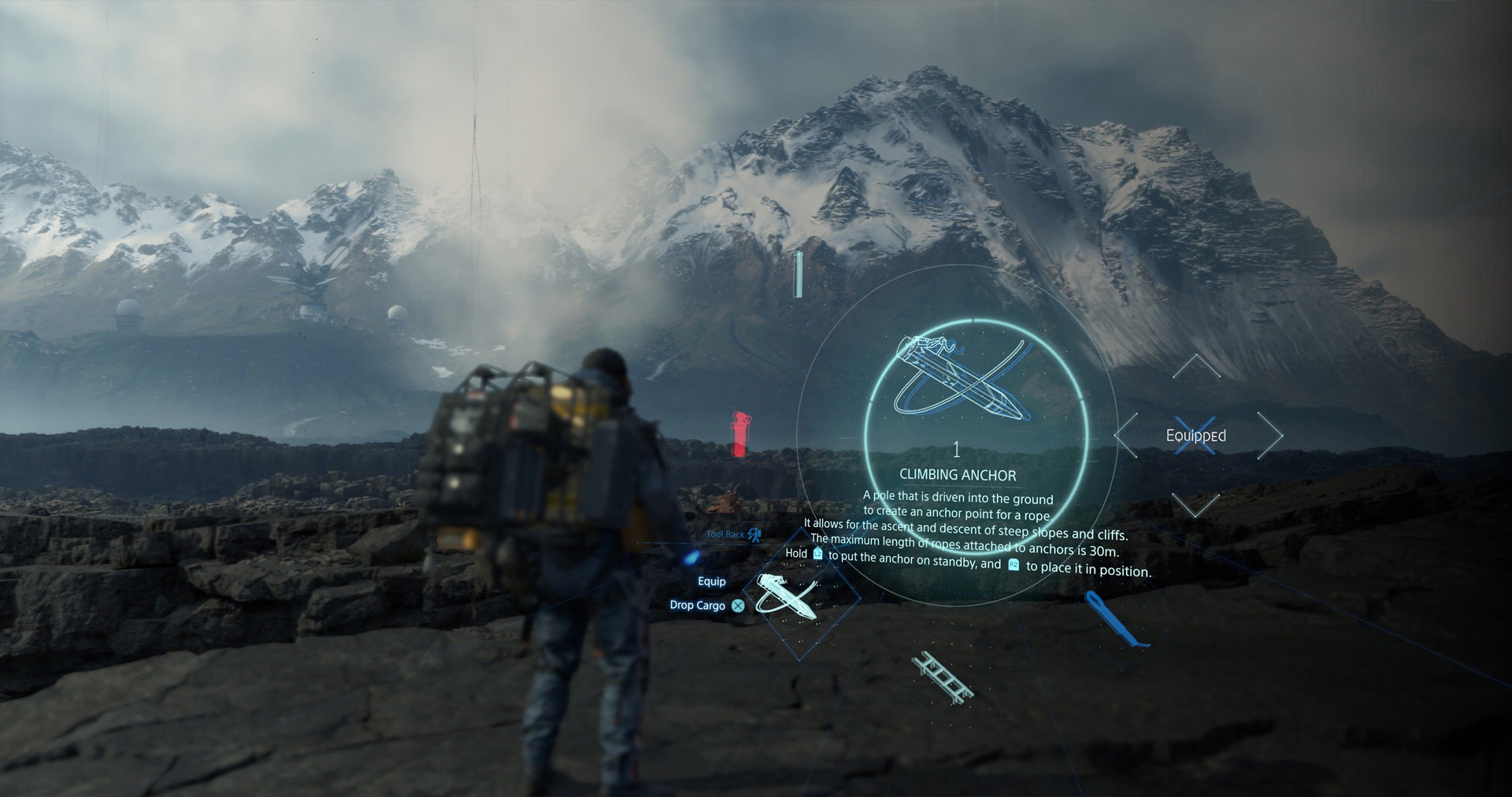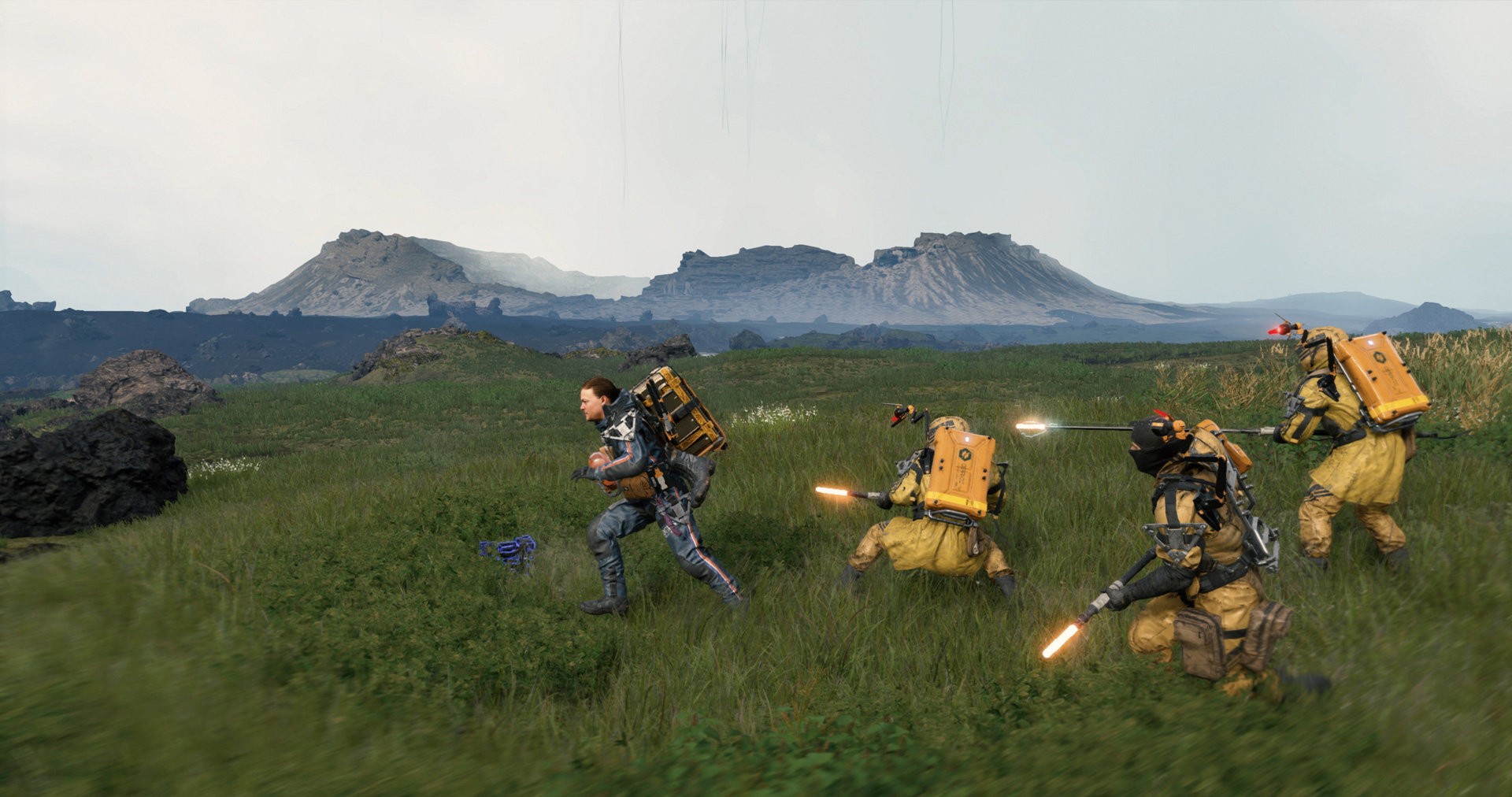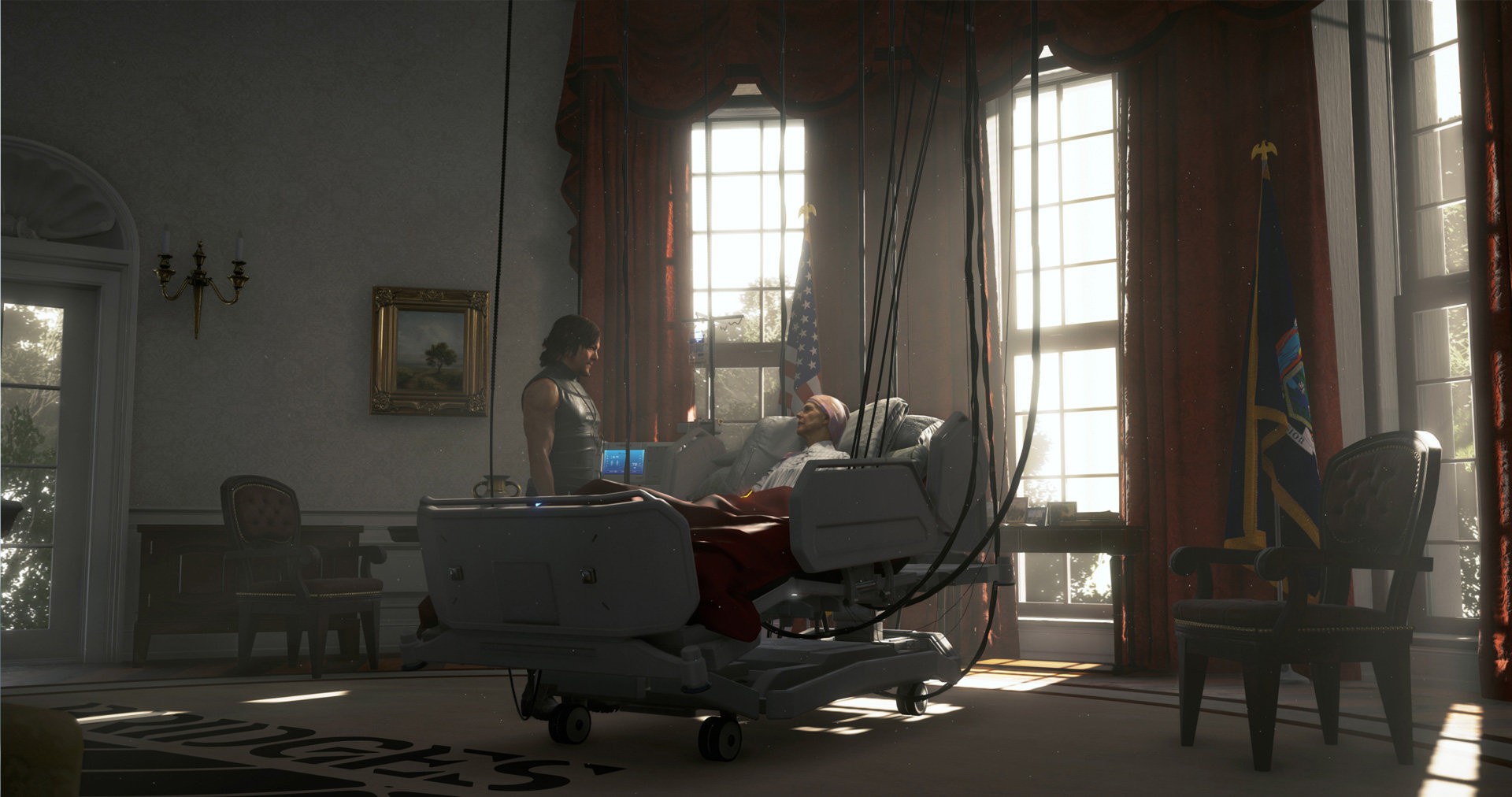 When I was growing up, I never thought highly of Hideo Kojima’s games. Sure, they were always held in high regard by players, and critics alike, but from some reason, they’ve always failed to click with me. As I grew older, I begun to appreciate Kojima’s talent, or rather madness more and more, as with titles such as Metal Gear Solid 3, and most importantly 4, I came to appreciate the artistic prowess of the Japanese mega star.
When I was growing up, I never thought highly of Hideo Kojima’s games. Sure, they were always held in high regard by players, and critics alike, but from some reason, they’ve always failed to click with me. As I grew older, I begun to appreciate Kojima’s talent, or rather madness more and more, as with titles such as Metal Gear Solid 3, and most importantly 4, I came to appreciate the artistic prowess of the Japanese mega star.
My appreciation of the art, of Hideo Kojima however, has done very little when the recently released Death Stranding was initially announced. As I was well aware that the man in question has an ego of astronomical proportions, and that without a firm grip of Konami, he might go of the rails a little too far. And now, after sinking well over forty hours into Death Stranding, I am more than reaffirmed that I was correct, since day one. And in all honesty, I couldn’t be any more glad, as Kojima’s latest, is so immensely mad, that it has managed to reach the heights which no game has ever reached before, and no other title may never even come close too.
On each and every single level, Death Stranding is a masterpiece. From the core design, through gameplay and narrative, and all the way down to the technical side of things, Death Stranding is simply second to none. And while it may come across as a banal DPD simulator, then such shallow perception couldn’t be further from the truth, as from exploration, through combat, Death Stranding is simply immaculate.
Death Stranding is an incredibly slow burning title, as the core exploration of the United Cities of America requires a lot of patience and resolve. However, the pay-out which follows each and every step which you take within the world of Death Stranding is simply incredible. From environmental storytelling, through NPC interaction, all the way to the Hollywood grade cutscenes, you are constantly being rewarded with immense narrative developments which does not just grow Sam, the protagonist, as a character, but the entire cast and the world as a whole.
The development of Death Stranding’s narrative leads to creation of a world which is not just genuine, but also one which feels alive, despite of the impending extinction. The interpersonal relations between all the characters are emotional and hold a great amount of importance, and the titular strand which connects Sam to the world, is ever growing and encapsulating. By the time you’ll reach the final credits you’ll feel like you, yourself, have been a part of this rather anxiety inducing journey. And this leads to a feeling which is quite difficult to describe, as by the five hour mark, you’ll realise that Death Stranding is not just a third-person adventure game, but rather a second-person epic.
I used the term second-person, because while you spectate Sam over his shoulder, for the majority of his journey, it never really feels like you are controlling him – but merely guiding. It’s almost as if Sam Porter, or rather Sam Porter Bridges is self-aware. He has a habit of breaking the fourth wall and referring to you, the player directly, and when resting within a safehouse, he will constantly gesticulate to point things out to you while staring at the camera; he’ll wink and smile, as if he is approving of your actions; and at times, he’ll even interact with you directly by grabbing the camera, or by throwing something in your direction.
What reaffirms me in my belief that Death Stranding is a second-person game, is the choice which has to be made towards the very end of the game. Directly you are giving two choices, but if you were paying attention, you’ll realise that Sam would not choose either, and in order to continue further, you have to guide him towards the third, and only choice, which does not just make sense to you, as the player, but suits Sam, and his character development to a tee. Because ultimately, while Death Stranding may be a game about the possible, and complete extinction of the humanity, it is truly about Sam, and him coming to terms with who he is, and most importantly with who he wants to become, by the time the journey is over.

Before you and Sam reach the end of the journey, you’ll have to cross United Cities of American, from east to west, and then back again. And this does not just involve walking on flat footpaths, and gravel roads. No, the world of Death Stranding is full of beautifully eerie environments which range from green plains split apart by rivers and rapids, steep and dangerous snowy mountains, dusty and asphyxiating deserts, and many other environments, which are not just great to spectate, but also a joy to explore.
Among all of the abovementioned, you will often come across Bridges controlled cities, MULE and Terrorist occupied encampments, preppers living in underground bunkers, and plethora of remains of the past civilization. And whenever you feel like you have seen it all, Death Stranding manages to surprise you – no matter how long you play it for. And while the title can be completed in as little as thirty-five to forty hours, it ultimately all comes to your approach and most importantly skill, as Death Stranding’s traversal can be a difficult task to overcome.
Sam, within the world of Death Stranding is a porter – meaning he hauls parcels from point A to point B. And while some deliveries may be just couple of hundreds of meters apart, down a straight and narrow road, then some, can require you to cross kilometres of land, over dangerous lands. And while there is enough to worry about as far as MULES, Terrorists, and BTS (the supernatural entities which infest America) go, then that’s not all.
Some early previews gave an impression that within Death Stranding, you can just load the cargo on your back, and simply jog to your destination. But in the full release, all cargo has its weight and specified dimensions, and obviously the more you carry, the heavier you are, and the taller is the stack on your back. But the weight and the size of the cargo doesn’t just slow you down. It affects all aspects of Sam’s physical capabilities. If you carry a heavy load, Sam will feel heavier, and traverse slower even on a flat land. His footing won’t be as accurate, and he will often lose his balance. Walking uphill with a large cargo can also be a problem, as its weight is constantly dragging you down; and if you happen to carry a heavy stack while crossing some steep, snowy peaks, you are bound to lose your balance within a split second, and slide all the way to the bottom, while losing your cargo on the way.
In order to make Sam’s journeys easier, and most importantly safer, you can refer to a wide range of tools and equipment, which will allow him to reach his destination not with complete ease, but definitely with an added layer of safety. Climbing ropes allows Sam, to climb up or down cliff sides, without having to jump down, or look for a different route. Ladders, help Sam bypass some of the steeper, more dangerous paths. Whereas exo-skeletons, can help Sam in a plethora of different ways. Power Skeleton, will allows Sam to hold a firmer balance while carrying even heavier loads; Speed Skeleton will allow Sam to outrun hostiles, or deliver small deliveries within short time span, and the All-Terrain Skeleton, gives Sam the ability take the some or the more dangerous routes, without the fear of slipping and sliding.
In addition to all the above, Sam can also use vehicles to make his work even more trivial. In-game, you find tricycles, a number of different trucks, and mobile carriers. And while they all have their positives, they also all have their negatives. Mobile carriers, can not be pulled up by Sam while he is climbing up a rope, Trucks large frames stop Sam from following some narrower shortcuts. Whereas the tricycles, or rather trikes, leave Sam susceptible to all forms of ranged attacks, as well as the Timefall, the rain which comes and goes, while slowly damaging your cargo over time.

Lastly come the structures, and those include things such as generators which can charge your batteries and vehicles; zip-lines which are by far the safest and fastest form of travel; Timefall shelters which protect Sam from rain, and repair his cargo containers; pavers which can build powered motorways, and even post-boxes which can be used to store your items. And while the vast majority of structures can be built using no resources, then the more intensive builds such as roads, bridges, and safehouses will require a sizeable amount of resources. And while gathering resources may be painful, then you don’t have to do it alone. In-fact you don’t even have to build majority of the structures yourself, as Death Stranding does feature a multi-player, but one which is rather unconventional.
While Death Stranding can be played in an offline mode, then it is ultimately at its best, when played online. As while online you have access to player created structures, shared safe boxes, holograms which work similarly to Dark Souls’ messages, and other players’ vehicles. And all those are a great help, when traversing Death Stranding’s America, and you can reward other players by awarding them likes whenever you want. And while likes are mostly meaningless in the real world, then within Death Stranding, they allow you to reach higher levels, unlock new equipment, and even elevate your status as a porter. But that is only the case when you, yourself build structures to aid other players on their journey to the titular Death Stranding.
Other players’ aid can be completely lifesaving, and this is especially true when it comes to combat, and boss encounters. As while fighting many of Death Stranding’s bosses, other players will emerge from the tar which covers the boss stages, and gift you anything from blood bags, through equipment, all the way down to assault rifles and rocket launchers. And there is no better feeling than watching a box of hematic grenades fall at your feet, as you are desperately scrambling to escape the monstrous BTs.
Above you had a chance to read me refer to grenades as hematic, and that’s because those particular grenades use Sam’s blood to inflict damage to supernatural entities. And while hematic grenades are the first weapon that Sam will get his hands onto, then ultimately, they’re just one of many. As within Death Stranding you will come across Bolo Guns, Assault Rifles, Shotguns, grenade launchers, and even four barrelled rocket launchers. And what makes it all even better, is that all the Death Stranding weapons possess different types of ammunition. Riot Shotguns can use hematic rounds or rubber bullets, whereas normal shotguns use hematic rounds, and standard buck shot; and Grenade Launchers feature hematic grenades, HE grenades, rubber bullets, and anaesthetic rounds.
With all those put together, you are bound to find something that will suit you. And while the title’s combat is immensely satisfying, then all your actions have their repercussions. Lethal weapons are immensely satisfying, but they do come with a bang, and the consequence of dead MULES and Terrorists subsequently turning into more BTs. On the other hand, non-lethal rounds do prevent BTs from spreading their dominance, but all the hostiles which you put to sleep, will sooner or later come to their senses, meaning that you will have to do your best to avoid them on your way back, or re-arm yourself, and fight them once again if and when the push comes to shove.
Just like Metal Gear Solid, Death Stranding always gives you an option to avoid conflict. And while in the latter stages you may grow confident in yours and Sam’s abilities, then the feeling of ever-looming anxiety will always be there. The tension which is ever present throughout the 40, 50, or even 60 hours never subsides. And leads to an experience, which tops the vast majority, if not all modern horror games. And what makes it even better, is that Death Stranding is not a horror game, but its harrowing world, and all that’s within it, make it one of the most intense experiences of all time.
After grinding through Death Stranding over the last week, I’m really struggling to say a single negative thing about it. It looks borderline perfect, it’s technically immaculate, the narrative is fantastically insane with its flow and plot-twists, and the gameplay – despite of everything that some have said – is simply excellent. And I’d like to say that Death Stranding is by far my game of the year, beating out even the incredible The Return of Obra Dinn; or that it is a game of generation toppling 2018’s perfect God of War. But I have to go a step further and say that it is by far, one of the greatest games ever created, if not the greatest. As to me, Death Stranding is the best game I’ve ever played. And while I doubted Kojima in the past, then Death Stranding has decimated all my doubts, and I can’t wait what Kojima Productions will create next.
REVIEW CODE: A complimentary Playstation 4 code was provided to Bonus Stage for this review. Please send all review code enquiries to press@4gn.co.uk.
Subscribe to our mailing list
Get the latest game reviews, news, features, and more straight to your inbox
Thank you for subscribing to Bonus Stage.
Something went wrong.
Death Stranding Review
-
Gameplay - 10/10
10/10
-
Graphics - 10/10
10/10
-
Sound - 10/10
10/10
-
Replay Value - 10/10
10/10
User Review
( votes)Overall
Summary
Death Stranding is a clear Game of The Year front-runner, simply as it is one of the best, if not the best, experience ever created.





